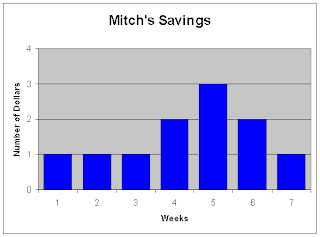GRAPHS
This is graphs.Anything and everything in this environment can be connected to graphs or graph theory.Graphs are basically a set of vertices and edges.It exhibits a relationship,often functional between elements of two sets by using coordinates.graphs are also called as plots.These definitions are not formal.These definitions connects graphs with real world activities or connects it with other branches of sciences.Actual definition of graphs is :Graph is a representation of set of objects where some pairs of objects are connected through links.
There are different types of graphs in Mathematics.Lets have a brief look on the basic classification of graphs.
- circle graph
- Bar graph
- Histogram
- line graph
- Picture Graph
History of graph theory

 The origin of graph theory started with the problem of Koinsber bridge, in 1735. This
The origin of graph theory started with the problem of Koinsber bridge, in 1735. This
problem lead to the concept of Eulerian Graph. Euler studied the problem of Koinsberg
bridge and constructed a structure to solve the problem called Eulerian graph. In 1840, A.F
Mobius gave the idea of complete graph and bipartite graph and Kuratowski proved that they
are planar by means of recreational problems. The concept of tree, (a connected graph without cycles was implemented by Gustav Kirchhoff in 1845, and the employed graph
theoretical ideas in the calculation of currents in electrical networks or circuits. In 1852,
Thomas Gutherie found the famous four color problem. Then in 1856, Thomas. P. Kirkman
and William R.Hamilton studied cycles on polyhydra and invented the concept called
Hamiltonian graph by studying trips that visited certain sites exactly once. In 1913,
H.Dudeney mentioned a puzzle problem. Eventhough the four color problem was invented it
was solved only after a century by Kenneth Appel and Wolfgang Haken. This time is
considered as the birth of Graph Theory. Caley studied particular analytical forms from
differential calculus to study the trees. This had many implications in theoretical chemistry.
This lead to the invention of enumerative graph theory. Any how the term “Graph” was
introduced by Sylvester in 1878 where he drew an analogy between “Quantic invariants” and
covariants of algebra and molecular diagrams. In 1941, Ramsey worked on colorations which
lead to the identification of another branch of graph theory called extremel graph theory. In
1969, the four color problem was solved using computers by Heinrich. The study of
asymptotic graph connectivity gave rise to random graph theory.
- Picture Graph
History of graph theory
The origin of graph theory started with the problem of Koinsber bridge, in 1735. This
problem lead to the concept of Eulerian Graph. Euler studied the problem of Koinsberg
bridge and constructed a structure to solve the problem called Eulerian graph. In 1840, A.F
Mobius gave the idea of complete graph and bipartite graph and Kuratowski proved that they
are planar by means of recreational problems. The concept of tree, (a connected graph without cycles was implemented by Gustav Kirchhoff in 1845, and the employed graph
theoretical ideas in the calculation of currents in electrical networks or circuits. In 1852,
Thomas Gutherie found the famous four color problem. Then in 1856, Thomas. P. Kirkman
and William R.Hamilton studied cycles on polyhydra and invented the concept called
Hamiltonian graph by studying trips that visited certain sites exactly once. In 1913,
H.Dudeney mentioned a puzzle problem. Eventhough the four color problem was invented it
was solved only after a century by Kenneth Appel and Wolfgang Haken. This time is
considered as the birth of Graph Theory. Caley studied particular analytical forms from
differential calculus to study the trees. This had many implications in theoretical chemistry.
This lead to the invention of enumerative graph theory. Any how the term “Graph” was
introduced by Sylvester in 1878 where he drew an analogy between “Quantic invariants” and
covariants of algebra and molecular diagrams. In 1941, Ramsey worked on colorations which
lead to the identification of another branch of graph theory called extremel graph theory. In
1969, the four color problem was solved using computers by Heinrich. The study of
asymptotic graph connectivity gave rise to random graph theory.






No comments:
Post a Comment